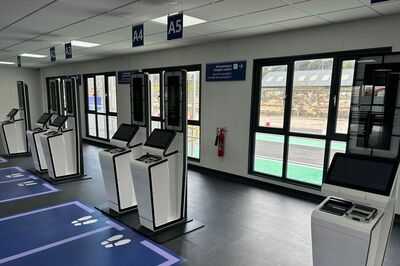Britishtourists are being warned to expect delays as a brand new EU entry-exit system comes into place, meaning the majority of travellers visiting a participating country for the first time will now have to register their biometric information at the EU border.
Under the Entry Exit System (EES), non-EU citizens must now have their passportscanned and their fingerprints and photograph taken before entering Europe’s Schengen area, which comprises 25 of the 27 EU member states, plus Iceland, Liechtenstein, Norway, and Switzerland. Those travelling to Ireland and Cyprus will not be required to undergo this process, the first phase of which came into force yesterday (October 12).
The UK government advises that: "Whilst the checks should only take one to two minutes for each person, they may lead to longer wait times at border control upon arrival in the Schengen area." In more gloomy predictions, experts have anticipated that passengers could well be delayed for as long as four hours.
READ MORE: 'I quit the UK for a life of constant sunshine and adventure in Qatar'
As reported byLBC News, Julia Lo Bue-Said, chief executive of Advantage Travel Partnership, a network of independent travel agents, cautioned: “For major airports in southern Europe, we recommend that travellers now allocate four hours for navigating the new system in these initial stages.”
Warning that “delays should be anticipated” at border controls when a number of flights arrive within the same window of time, she added: “We foresee potentially overwhelming volumes of travellers during the initial roll-out”. Fortunately, it's expected that "this should settle over the next few weeks as staff and travellers familiarise themselves with the new procedures.”
Meanwhile, Rory Boland, editor of consumer magazine Which? Travel stated: “Longer waits are expected at border control on arrival, so you should allow more time when you land by booking later transfers or other onward travel.”

As explained by the Home Office, this new system will be phased in over a six-month period, which may mean there will be varying requirements between different ports up until April 2026. It's hoped that this gradual implementation will help to minimise disruption, especially during particularly busy times.
Minister for Aviation, Maritime and Decarbonisation, Keir Mather, has issued the following statement: "We’ve backed our ports and operators with £10.5million to help them get ready for the EU’s new Entry/Exit System, ensuring they have the infrastructure and systems in place to manage the changes.
"Our priority is to minimise disruption for travellers and hauliers, particularly at our busiest border crossings. We’ll continue working closely with European partners and local resilience forums to keep traffic flowing and journeys smooth."
The process is completely free, and travellers won't need to do anything differently before travelling. Although children under 12 years old won't need to have their fingerprints taken, all travellers, including babies, will have photographs taken and digital records created.
EES has been introduced to eventually replace passport stamping for non-EU citizens, "helping them to track compliance with the 90-day visa-free travel rule and strengthen their border control", and is expected to ensure quicker, more efficient border crossings in the long run.
A government awareness campaign was introduced last month to help prepare Brits ahead of the roll-out, with advisory public messages shared via government social media channels, as well as by transport operators and on travel websites. You can also check out up-to-date information on GOV.UK and FCDO’s Travel Aware pages.
Do you have a story to share? Email me at julia.banim@reachplc.com
READ MORE: Copy Taylor Swift’s £5k initial tennis bracelet with £45 personalised version perfect for Christmas gifting
You may also like

No Nobel? No problem. Netanyahu nominates Israel's 'greatest friend' Donald Trump for country's highest award

Bengal gangrape: Two more arrested; all five accused now in custody

Reese Witherspoon on new novel: This is a love letter to my mom and dad

Amaravati construction on self-financing basis, says CM Naidu

112 Aspirational districts now mapped via PM Gati Shakti District Master Plan: Piyush Goyal






